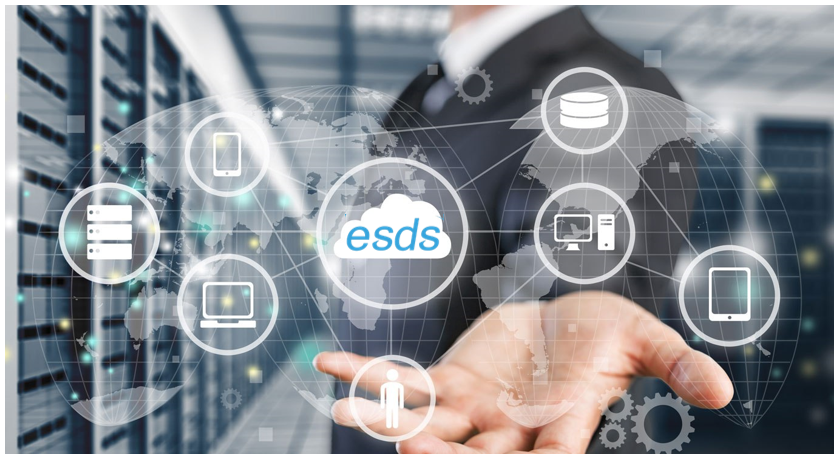Data Center Services in India
Data Center is a key parameter for any business and ESDS is one of the CSPs to provide best Data Center Services in India.
What do you mean by Data Center Services?
Data Center Services is an umbrella term used to describe services which create, execute, enhance or maintain a data center for an organization. Basically, data center services include all the facilities related to IT components and activities. It can involve software, hardware, personnel, and processes.
Types of Data Centers
- Enterprise Data Centers
Previously, enterprises built their own data centers on their own sites. However, building private data centers has not quite proved to be the best investment of companies’ precious capital because considering the construction and maintenance costs. CEOs and CIOs started realizing that these financial resources could be used in business development.
- Managed Service Provider
Managed Service Provider remotely controls customers’ IT infrastructure proactively on a subscription model. The IT infrastructure is on the service providers’ sites and the services are provided to the end customers remotely. There are various pricing models which change according to a number of devices and users based on the IT support and management services.
- Colocation
A colocation data center facility is a business where the customer rents space in the providers’ premises for computing hardware. A colocation service provides building, cooling, power, and physical security while the customer provides storage and servers. The main reason businesses choose colocation service is the CAPEX related with building, maintenance and taking care of large computing facilities.
- Wholesale Data Centers
Wholesale Data Center also known as Multi-Tenant Data Center benefits large companies which need large portions of space than a typical colocation provider would offer. A wholesale data center service provider would generally offer huge space to customers who need more space for their IT hardware. Wholesale colocation is generally offered at cheaper rates compared to retail colocation.
Data Center Facilities & Services
Data Center facilities include
- In-house Facilities
An organization can have in-house facilities where they can design, build and operate a data center in their own premises. There is no involvement of a third party because the organization takes it on them to provide the necessary requirements to run their operations. An experienced IT team is necessary to maintain a complex data center architecture.
- Colocation Facilities
Colocation facilities are provided by a third party and are the exact opposite of in-house facilities because they are multi-tenant accessible. Multiple businesses can choose to house their equipment in third-party data centers. Customers can choose solutions which are specific to their business when buying colocation facilities.
- Dedicated Hosting
In a dedicated hosting solution, customers have full control over the server allocated to them. The server and storage is completely dedicated to one customer or one business for a single purpose. The customer manages all the hardware himself and maintains the equipment without sharing it with any other customers.
- Managed Hosting
Managed hosting is similar to dedicated hosting as it falls under similar conventions but provides an additional set of features to customers who use their servers. The additional services include database and system administration, managed security, system monitoring, application management services and much more. The hardware may be owned by the provider or the customer but the management of those servers is the responsibility of the provider and not the customer.
- Shared Hosting
In a shared hosting environment, the customer shares the server as it acts as a host to multiple clients or businesses. The shared hosting includes the sharing of the applications and software within the physical server. The hosting provider deploys an interface which allows multiple customers to customize their services according to their business needs. Shared hosting is cost-efficient because there is no need to employ technical staff to manage your website and also the cost of the server is shared.
Data Center Infrastructure Management (DCIM)
Data center infrastructure management tools track the performance of IT related equipment to analyze data about infrastructure components such as servers, storage, network, etc. It also helps in the decision-making process as well as aids in optimal use of IT hardware. DCIM tools enable data centers to control storage, power, and cooling in real time. The tools basically administer the relationship between the facility and the IT systems. The energy monitoring sensors can be installed in the data center to analyze power usage effectiveness and cooling system energy efficiency. This type of approach is called Continuous Modeling which allows the IT head to observe the changes in the infrastructure and make decisions based on the data.
Data Center Operations
The processes which are performed within a data center are basically known as data center operations. There are infrastructure operations which include installing, managing, monitoring and updating servers along with storage and network resources. Security is essential for any data center which includes physical and logical security in the premises. Management of all the processes within the data center should be taken care of along with monitoring of policies. To let your data center function smoothly it is essential to consider the consistency of operations which ensures continuous availability of facilities.
Conclusion
Enterprises can no longer ignore the fact that data centers have become very essential for the functioning of big business. Data centers have become a key parameter of any business when it comes to IT infrastructure requirements. Particular interruptions in your data center can bring your business to its knees and thus, it is important to have strategies in place.
- Why you should choose Cloud Managed Services - May 14, 2021
- Understanding SAP BASIS Support - January 27, 2021
- Cloud Computing – Types of Cloud - January 18, 2021
